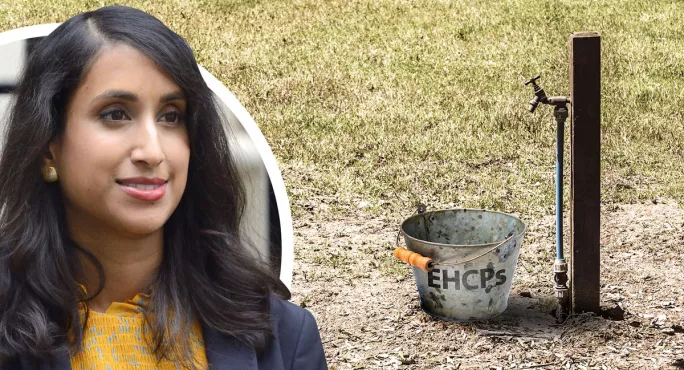Ministers ‘absolutely not’ trying to ration EHCPs

The government is not trying to “ration” the number of education, health and care plans (EHCPs) being issued through its special educational needs and disabilities (SEND) reforms, a minister has said today.
Children and families minister Claire Coutinho said she expected demand for EHCPs to drop as support in mainstream schools and early identification of needs improve, but that the government was not working towards a target.
She was giving evidence to the Commons Education Select Committee today in a session on the government’s SEND and Alternative Provision plan announced earlier this year.
Committee chair Robin Walker asked the minister why the Department for Education had refused to publish its projections of how the demand for EHCPs would be affected by its SEND reforms - following a freedom of information request by Tes.
- Exclusive: DfE refuse to publish EHCP projections
- Concern: SEND reforms about saving money, experts warn
- SEND plan: Everything you need to know
Mr Walker, a former schools minister, said there was a concern in the sector that the motivation behind the government’s SEND and alternative provision plan was “to effectively ration EHCPs” and he asked the minister if she could categorically rule this out.
In response, Ms Coutinho said: “That is absolutely not what we are trying to do. As much as I want to prevent children needing EHCPs as their situation has escalated, at the same time, it may well be that there are children who aren’t accessing EHCPs who really should have them.”
She added: “This isn’t about targeting a particular reduction, it’s just about improving systems so that you can get better outcomes for SEND people.”
Alison Ismail, director for SEND and alternative provision at the DfE, added: “We refer in the improvement plan to a hypothesis that, if we make that movement…improving mainstream provision and also improving what is available in specialist, that you would start to see a decrease in the need for EHCPs... but we weren’t projecting to a particular target as such.”
SEND experts have previously warned the committee that the aim of the government reforms is “saving money rather than improving the experience or outcomes for pupils”.
Managing the demand for EHCPs features in a number of the latest “safety valve” funding agreements between councils and the government.
Under these deals, councils agree to reform their SEND provision to wipe out high-needs deficits in return for a government bailout.
The DfE announced in March that 20 more councils had agreed to these “safety valve” deals, which will involve them receiving around £585 million in total from the government.
The latest deals published show that the majority of the 20 councils have agreed to make changes in their management of EHCPs and some authorities have agreed to reduce a “reliance” on EHCPs.
‘We should be thinking about value for money’
Ms Coutinho was also questioned on other aspects of the DfE’s SEND and Alternative Provision Improvement Plan today.
She told the committee that as part of its plan to create a new system of tariffs and banding for SEND provision, the department was looking at price variations in local council areas.
The plan for a standardised system of tariffs was announced in the SEND Green Paper last year and is part of the DfE’s SEND and Alternative Provision Improvement Plan.
Ms Coutinho said: “I don’t want to have any system which would deny them getting the support they need to succeed.”
She then added: “However, if there are instances where provision is similar in terms of outcomes but where one is much, much more expensive than the other then we should be thinking about value for money because overall that means you can provide support to more children.”
MP Miriam Cates said there are concerns that the DfE banding system will allow councils to reduce choice on the basis of cost. In response, Ms Coutinho says the plan is to be able to give parents better information about SEND provision available.
Flick Drummond MP voiced concerns over the lack of special school expertise within Ofsted inspectors.
MPs were told this was a matter for Ofsted’s chief inspector, but Ms Ismail said it was something the department could look at.
During today’s session, Ms Coutinho also told MPs that the department was carrying out a national scoping exercise on the capacity and demand for places at special schools.
You need a Tes subscription to read this article
Subscribe now to read this article and get other subscriber-only content:
- Unlimited access to all Tes magazine content
- Exclusive subscriber-only stories
- Award-winning email newsletters
Already a subscriber? Log in
You need a subscription to read this article
Subscribe now to read this article and get other subscriber-only content, including:
- Unlimited access to all Tes magazine content
- Exclusive subscriber-only stories
- Award-winning email newsletters
topics in this article



